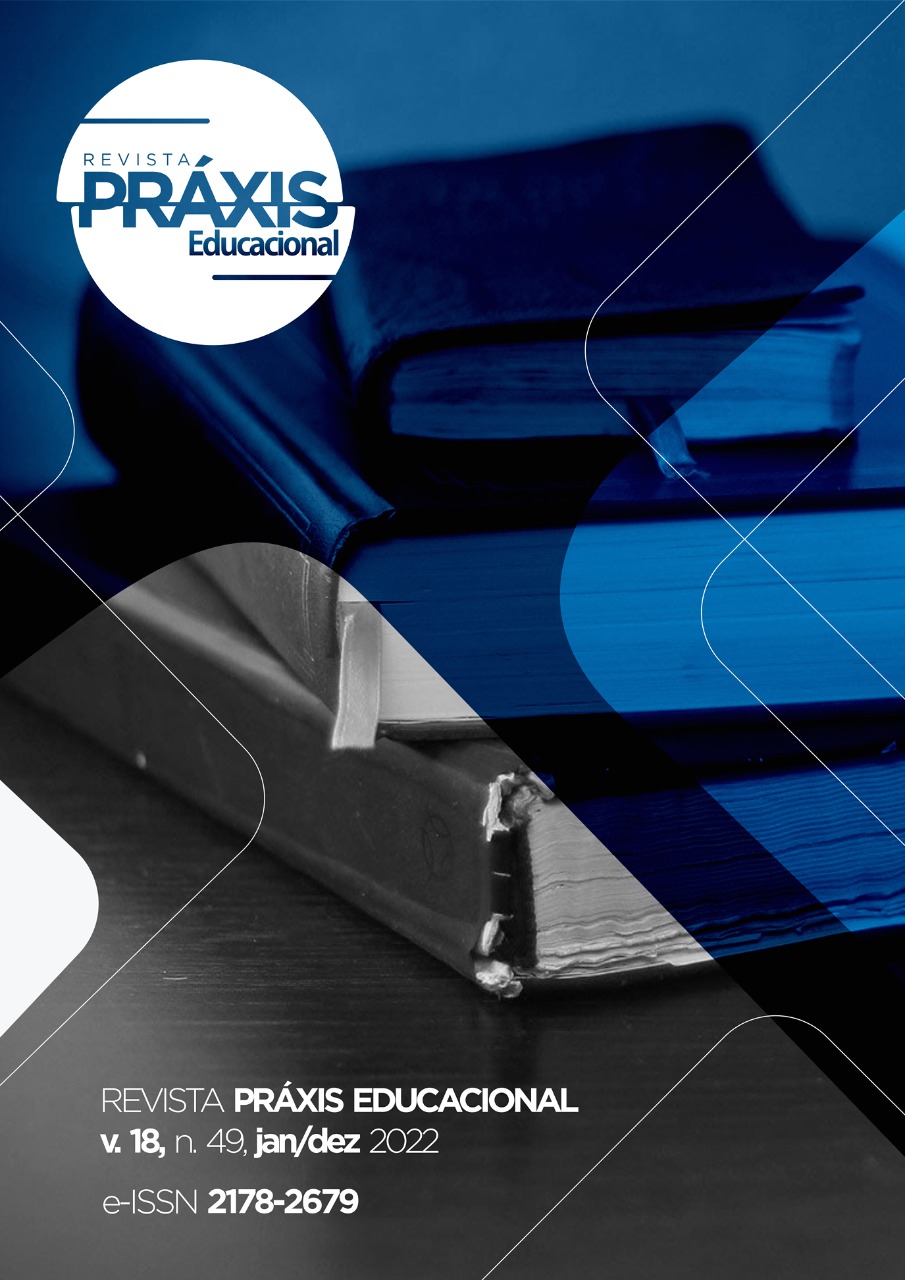Colonizing prescriptions and possible overflows on the history curriculum
DOI:
https://doi.org/10.22481/praxisedu.v18i49.10499Keywords:
difference, history teaching, otherAbstract
This article’s objective is to present reflections in the context of History Teaching in dialogue with scenarios experienced in the exercise of teaching, in the discipline of History, in a public school in the state of São Paulo, in the context of the pandemic caused by SARS-CoV-2, in remote teaching modality. To do so, we anchored urselves in reports collected during classes and bibliographic studies, in the field of curriculum studies and History teaching. This teaching practice made possible problematizations between the content offered in line with the official guidelines and its unfolding amongst the students. Faced with the relationship between the official curriculum and students, the central question of this work emerged: to discuss the place of the Other and the Difference in the São Paulo curriculum during the pandemic. In the end, these implications direct us to reflect on how a problematized education alters not only the teaching practices, but also the student's profiles, reflecting in a democratic society.
Downloads
Metrics
References
ALMEIDA, Fabiana Rodrigues de. A ANATOMIA DE UMA INTERDIÇÃO: narrativas, apagamentos e silenciamentos na construção da BNCC de História. 2021. 328 f. Tese (Programa de Pós-graduação em Educação) – Universidade Federal de Juiz de Fora, Juiz de Fora- MG, 2021.
FREIRE, Paulo. Pedagogia do oprimido. 73.ed.- Rio de Janeiro/São Paulo: Paz e Terra, 2020, p. 95-101.
GÓES, José Cristian. Quem somos nós na fila do pão?: a fabricação dos invisíveis na história do Brasil. Sergipe, SE: Segrase, 2021.
KOHLS, Rosana Cristina; COCOO, Ricardo; CELLA, Rosenei. Os sentidos da formação humana: perspectivas para uma educação emancipadora e humanizadora. Revista Tempos E Espaços Em Educação, 13(32), 1-17, 2020. DOI: https://doi.org/10.20952/revtee.v13i32.13383. Disponível em: https://seer.ufs.br/index.php/revtee/article/view/13383 . Acesso em: 14 mar. 2022.
LE GOFF, Jacques. História e Memória. 4.ed. Campinas: Editora da Unicamp, 1996.
LÉVINAS, Emmanuel. Totalidade e Infinito. Lisboa: Edições 70, 1980.
PEREIRA, Nilton Mullet; SEFFNER, Fernando. Ensino de História: passados vivos e educação em questões sensíveis. Revista História Hoje. Rio de Janeiro, vol. 7, nº 13, p. 14-33, jan.2018/ago.2018.
SÁ, Rubens Lacerda de. Ética, decolonialidade e migração à luz do pensamento freireano. Práxis Educacional, [S. l.], v. 17, n. 47, p. 44-65, 2021. DOI: 10.22481/praxisedu.v17i47.8739. Disponível em: https://periodicos2.uesb.br/index.php/praxis/article/view/8739 . Acesso em: 15 mar. 2022.
SÃO PAULO. Secretaria da Educação do Estado de São Paulo. Currículo Paulista. São Paulo: SEE, 2021. Disponível em: https://efape.educacao.sp.gov.br/curriculopaulista/wp-content/uploads/download/habilidades-essenciais-ensino%20medio%202021/Habilidades%20Essenciais%20de%20Hist%C3%B3ria%20-%20E.M%20%20Alterado%2015-02.pdf?_t=1613499000 . Acesso em: 09 mar. 2022.
SÃO PAULO. Secretaria da Educação do Estado de São Paulo. Plano Estratégico 2019-2022. Educação Para o Século XXI. São Paulo: SEE. Disponível em: https://www.educacao.sp.gov.br/wp-content/uploads/2019/07/Plano-estrategico2019-2022_final-5-min.pdf . Acesso em: 08 jul. 2021.
SILVA NETO, João Paulino. Saberes dos povos indígenas Maya e Yanomami : desafios epistêmicos no processo de descolonização. Boa Vista: Editora da UFRR, 2020.
SILVA, Tomaz Tadeu da. Documentos de Identidade: uma introdução as teorias do currículo. 2.ed. 9ª reimp. Belo Horizonte: Autentica, 2005.
Downloads
Published
How to Cite
Issue
Section
License
Copyright (c) 2022 Práxis Educacional

This work is licensed under a Creative Commons Attribution-ShareAlike 4.0 International License.
You are free to:
Share - copy and redistribute the material in any medium or format; Adapt - remix, transform, and build from the material for any purpose, even commercially. This license is acceptable for Free Cultural Works. The licensor cannot revoke these freedoms as long as you follow the terms of the license.
Under the following terms:
Attribution - You must appropriately give credit, provide a link to the license, and indicate if any changes have been made. You may do so in any reasonable way, but not in a way that suggests that you or your use is endorsed by the licensor.
There are no additional restrictions - You cannot apply legal terms or technological measures that legally restrict others to make any use permitted by the license.










